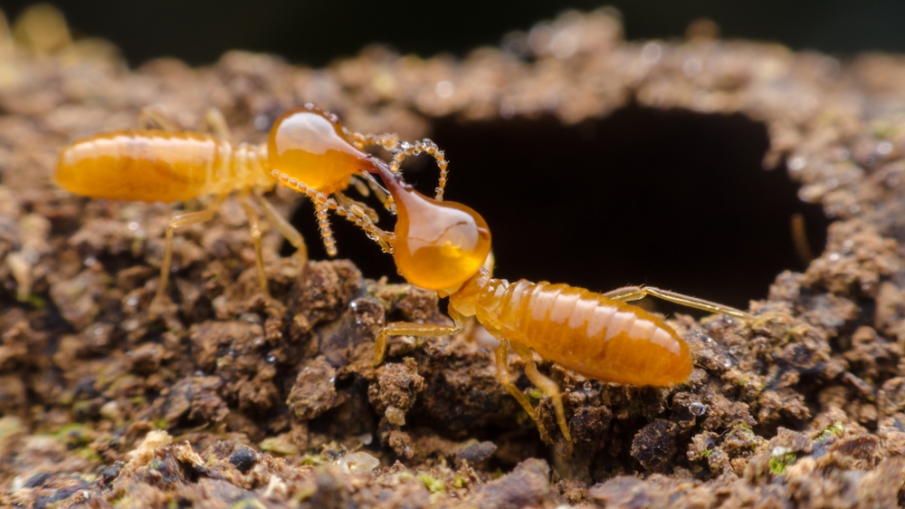When the temperature begins to drop, some animals hibernate, some fly south, while others look for a place to stay warm and cozy the winter season. Sometimes, this place is inside your home.
The winter season already brings cold weather, slick roads, and other inconveniences, so dealing with an infestation of pests in your home is that last thing you want to do! Many pests that invade your home for the winter will damage your property, contaminate your food, and overall disorder in your home. Four common pests to look out for this winter include:
Spiders
With a variety of spiders out there, each kind of spider needs shelter to survive the winter, but each type of spider reacts differently to the winter season. Common house spiders move into homes to a find a place to settle down and stay warm. They tend to build their webs near entry points of the home such as window and door frames, in the rafters, or near the ceiling where they can prey on insects that are trying to get into your home. Spiders will build their nests in more secluded areas like basements or attics where the nest has the lowest chance of being disturbed.
With excellent climbing abilities, spiders can access exterior openings that most pest can’t such as high access windows or cracks in roofing tiles. To ensure you seal up all possible entry points, check the area near the webs for openings where spiders and other pests can get in.
Rodents
Rats and mice can easily sense changes in the weather and will have a quick reaction once the weather begins to cool off. Rodents are sensitive to weather changes and can feel subtle changes in air pressure and temperature, allowing them to feel for drafts that are the result of hot air leaking out of your home. Once they sense the draft, the can trace it back to the source and enter the home.
Rodents can fit through tiny openings, so to effectively keep rodents out of your home for the winter, it is crucial to locate and seal up any crevices or cracks where drafts can occur.
It is best to start in the basement when sealing up your home, checking for signs of escaping air or slivers of light near areas like the foundation, insulation, and siding that indicate openings that need to be sealed. It is essential to check for cold air near the walls, sealing up areas where the utilities come into the home. Winter is also a great time to verify that your door and window weatherproofing is intact and ineffective, working order to keep out pests like rodents.
Bed Bugs
Bed bugs are a significant issue during the holiday season, gaining entry to your home after hitching a ride on luggage or clothing. These pests infest your bed and can bite you, causing a red, itchy rash. These pests are very small and flat as well as quiet and dark, making it easy for them to go unnoticed. To present bringing a bug infestation home with you after our holiday vacation visiting family, be sure to carefully check the items you bring into and take out of your home.
Although their name indicates they are found in beds, they also enjoy hiding in clothing, bags, and suitcases. To be sure you don’t have any unwanted passengers when you travel back home, be sure to keep your bags closed and off the ground of the hotel room. Also, inspect the back of the headboards, upholstered furniture as well as the mattress seams and bed frame with a flashlight and magnifier for bed bugs.
Do not lay your clothing or your suitcase on the floor. Be sure you double check the items you were traveling with for bed bugs before bringing them back into your home. It is also essential to run your clothing through the dryer, even if you didn’t wear it on your trip.
If you notice small black droppings, blood stains, or shed skins at the bottom of your bed sheet or if you experience an itchy, red rash, it is likely you have a bed bug infestation.
Termites
Termites do not hibernate or die in the winter and can remain active in your home over the winter. They can’t survive the harsh conditions of winter, leading many to believe they hibernate or die off in the winter. In reality, if they have already made their way into the comfort of your home, the winter conditions won’t affect them.
If you had a termite infestation that began in the summer or the fall, they could continue to damage your home even over the winter.
Termites are attracted to food, water, and shelter sources. Because they feed on wood, they can become dehydrated very easily, so they will typically infest wood that is either moist or near a source of moisture.
They tend to target wood that has already been damaged, so it is important to replace any wooden frames or siding in your home that has been damaged.
Professional Pest Control Services
It may be tempting to treat your home with store-bought remedies, but it is essential to enlist the help of a professional when it comes to combating pest infestations to ensure you receive the most effective results.
As the colder weather drive pest indoors, don’t let your home become a home for these common pests. Contact your local pest control service provider today to receive expert, comprehensive pest control treatment to keep your winter pest free.


Leave a Reply